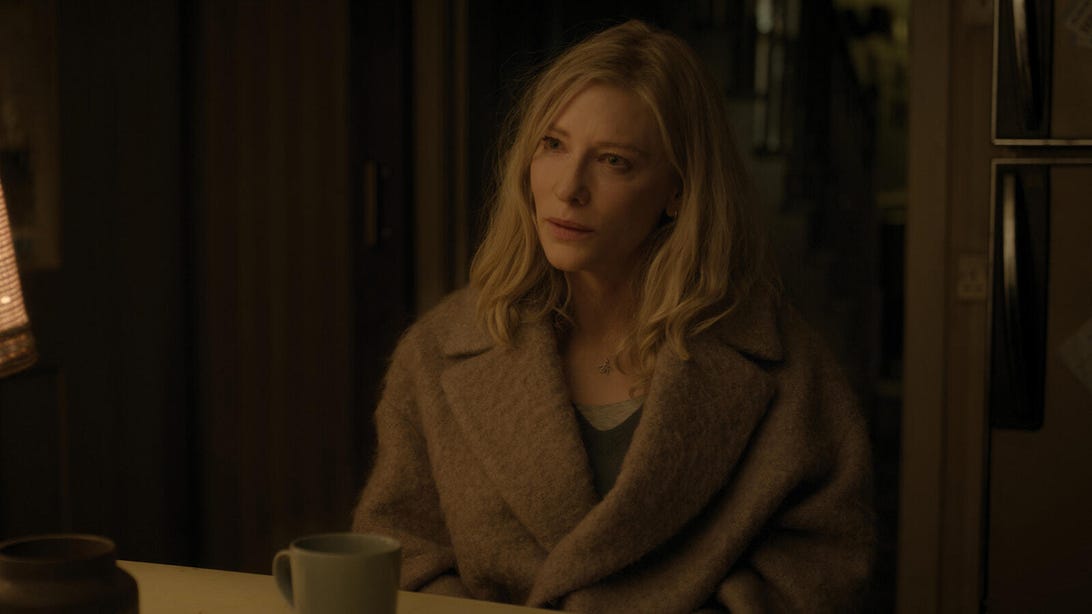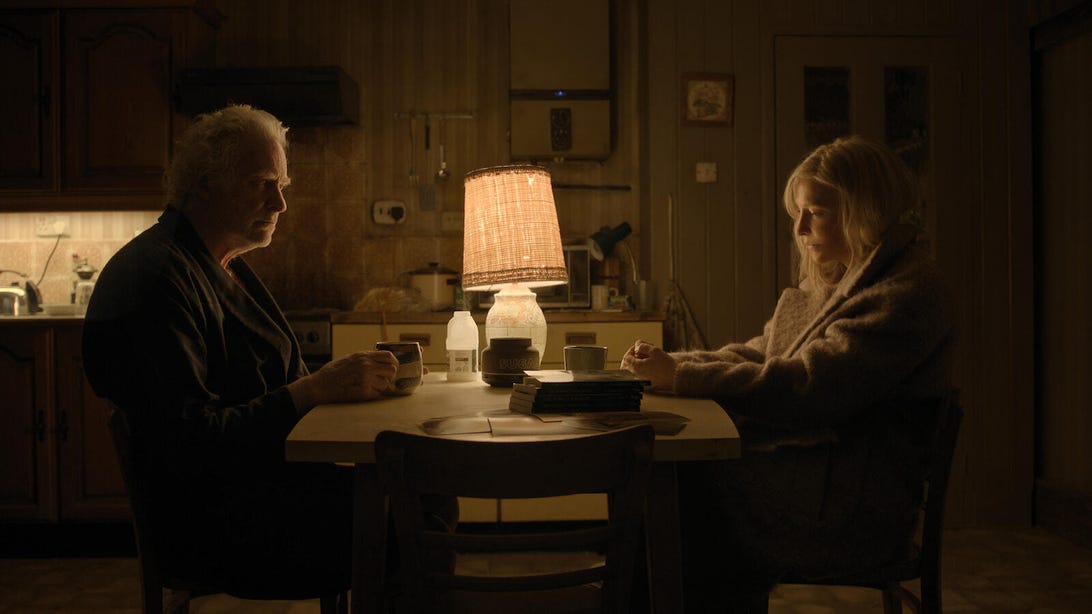Join or Sign In
Sign in to customize your TV listings
By joining TV Guide, you agree to our Terms of Use and acknowledge the data practices in our Privacy Policy.
Disclaimer's Dreadful Finale Twist Cheapens the Whole Show
The Apple TV+ drama pats itself on the back for an unearned ending

Cate Blanchett, Disclaimer
Apple TV+"It's time for my voice to be heard," Catherine Ravenscroft (Cate Blanchett) proclaims at the end of Disclaimer's penultimate episode. In the preceding six hours, the Apple TV+ series has put its central figure through the wringer to an arguably excessive degree. That's thanks to Stephen Brigstocke (Kevin Kline), from whose willfully limited perspective Disclaimer largely derives its plot. When the series does turn its focus on Catherine, she's often seen through the eyes of her pathetic husband, Robert (Sacha Baron Cohen), or her burnout son, Nicholas (Kodi Smit-McPhee), or, in dreamy flashbacks, Stephen's wide-eyed son, Jonathan (Louis Partridge). In the past, Catherine is a sex goddess guiding Jonathan through an Italian tryst; in the present, she's a woman on the perpetual razor's edge of a nervous breakdown, though it's never made entirely clear what's going on inside her head. When she finally gets to speak at length in the finale, which picks up immediately where the sixth episode left off, Disclaimer presents her truth as a bitter gotcha with a wannabe feminist twist. Ultimately, the only thing an ending like this succeeds at is undermining everything that came before it.
Long before Catherine is allowed to speak up, it's clear something about Stephen's version of events is off. Decades ago, Jonathan died while vacationing in Italy, turning his grieving mother, Nancy (Lesley Manville), into an amateur sleuth as she uncovered what she believed to be the facts of the situation: that Jonathan had met and had a blissful affair with Catherine (played as a young woman by Leila George), that he'd drowned while selflessly rescuing Nicholas from the ocean, and that Catherine had allowed his death to happen without sparing a second thought. Plagued by grief, Nancy wrote a novel called The Perfect Stranger about Catherine and Jonathan's fling, which Stephen gets to a publisher after Nancy's death — the first step in his plan to destroy Catherine's life, which he pursues with cartoonish glee. He torpedoes her marriage and career as a documentarian. He catfishes Nicholas, sending him to the hospital after pushing him into a near-fatal overdose. If that all feels a little too one note, that's because it is.
In a he said-she said twist, the finale reveals that Catherine isn't anything close to the monster the Brigstockes thought her to be. At the end of her rope and desperate for the torture to stop, Catherine tells Stephen, in harrowingly descripitive detail, what actually happened between herself and Jonathan all those years ago. After a teenage Jonathan had a chance encounter with her while vacationing in the same part of Italy, he broke into Catherine's hotel room in the middle of the night, proceeding to hold her at knife-point while pushing her to take explicit photos and, later, repeatedly raping her. At one point, she remembers, he also made her console Nicholas after he woke up, all while Jonathan stood menacingly just outside the bedroom door, brandishing his weapon as a reminder of Catherine's own powerlessness. The next day, Jonathan appeared on the beach to pull Nicholas out of the water when he drifted too far, saving the boy but dying after being swept up by the current, all while Catherine watched. "I would have given anything to watch him die," she tells a horrified Stephen. "So, when he drowned, I walked away. That's the truth, and I won't pretend to be sorry about it."

Kevin Kline and Cate Blanchett, Disclaimer
Apple TV+Stephen, naturally, doesn't believe her — she has no proof, after all. But, seeing Jonathan's death as a way of putting the entire incident behind her, Catherine never planned on saying anything, not wanting to relive the painful assault. "The only reason I am telling you is because I want you to stop," Catherine says furiously. "I want you to leave me and my son alone." When she discovered she was pregnant after returning home, she quickly terminated the pregnancy. Though she and Robert had discussed wanting more children, the uncertainty of the baby's parentage would have been too much for her to bear. It's at this point that the drugs Stephen had slipped into Catherine's tea, which she'd sipped while recounting her story, kick in, leaving her passed out on the floor of the dingy Brigstocke kitchen while Stephen, undeterred, goes to see through the last part of his plan: killing Nicholas and forcing Catherine to suffer the same grief Stephen and Nancy did.
There's a smugness with which Disclaimer presents this information. The strategy of deliberately withholding the truth from the audience, only to reveal it late in the game, is nothing new: This year's buzzy Colleen Hoover adaptation It Ends with Us employed the same tactic with its depiction of domestic abuse, while Rian Johnson based an entire murder mystery series around this maneuver with his Knives Out series. These examples exist on opposite ends of the spectrum, of course, but they have the same self-satisfied attitude about it that Disclaimer does.
Sure, there was always reason for the audience to wonder whether the events of Nancy's novel were based in reality. She wasn't there, and she based her story on the photographs she'd uncovered from Jonathan's belongings, and on Catherine's stature as an icily successful working mother. But throughout its first six hours, Disclaimer doesn't bother to sow any suspicion as it lets a vengeful Stephen steer the narrative. The show delivers a meta warning early in its first episode — "Beware of narrative and form," says guest star Christiane Amanpour, playing herself. "Their power can bring us closer to the truth, but they can also be a weapon with a great power to manipulate" — but there's a stark difference between telling the viewer that clues were always there and making a coherent story about unreliability. We saw exactly what series creator, director, and writer Alfonso Cuarón wanted us to see. Why would we doubt that what we were watching was true when there was no reason to?
Beyond that, the series is just a bit too eager to show Jonathan's brutal assault of Catherine, a bit too quick to imply that the only way a woman can be believed is if she confesses the details of the worst moment of her life. It's not the kind of ending that gives Catherine any redemption. A scorned Robert chose to trust a stranger over his wife, hurt by her emasculation of him throughout their marriage and disgusted at the prospect of her cheating. It takes Catherine divulging the entire horrifying story of her assault for her to receive an apology. In the end, Stephen abandons his crusade against the family, experiencing a change of heart when an exhausted Nicholas mistakes him for his mother. As Stephen leaves, Robert furiously confronts him: "Why didn't you question it?" he wonders. "No, Mr. Ravenscroft," Stephen corrects. "Why didn't you?" That exchange is about all the introspection Disclaimer is willing to do on the subject — blaming the audience for not looking deeper into the truth when we weren't given the tools to do so.
A good last-minute twist is one thing, and it's not impossible. But proper execution always relies on how effectively the groundwork was laid. Instead, Disclaimer's final hour gives itself a pat on the back while presenting its middle finger to the viewer.
Disclaimer is now streaming on Apple TV+.
